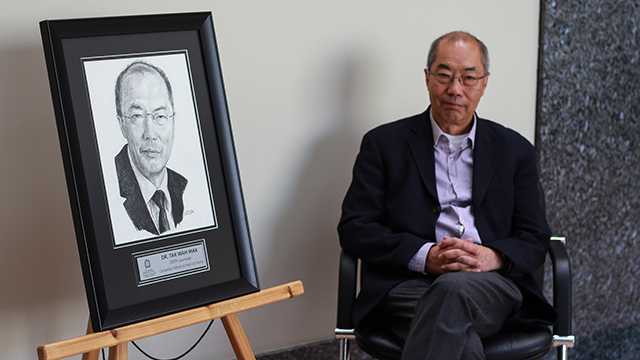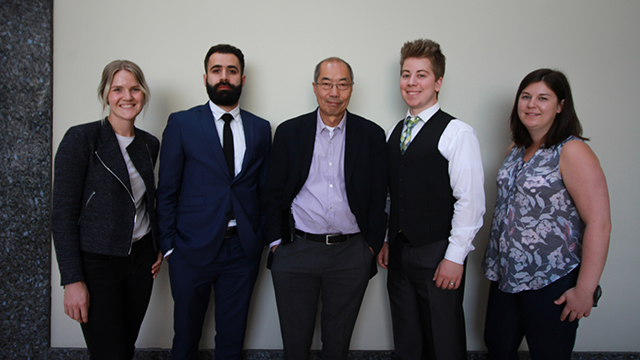
Canadian Medical Hall of Fame Laureate and alumnus Tak Mak with his portrait, which is now on display outside the Faculty of Medicine & Dentistry's Dean's Office in the Walter C. Mackenzie Health Sciences Centre.
An impressive collection of seven original portraits of University of Alberta affiliated Canadian Medical Hall of Fame Laureates were proudly displayed in a prominent corner outside the Faculty of Medicine & Dentistry's Dean's Office, just in time to inspire our incoming and returning students buzzing through the halls of the Walter C. Mackenzie Health Sciences Centre this September.
Among the featured Canadian heroes is U of A alumnus Tak Wah Mak, '72 PhD. Inducted into the Canadian Medical Hall of Fame in 2009, Mak identified the structure of the T-cell receptor for antigens in 1983, leading to critical discoveries in immunology, signal transduction and cancer biology. He is a professor of medical biophysics at the University of Toronto and current director of the Campbell Family Institute for Breast Cancer Research at the Princess Margaret Hospital.
Inspiring future generations
Mak was invited by the U of A's Medical Genetics Students' Association (MGSA) to be the keynote speaker at Medical Genetics Research Day, an annual event organized and hosted by the MGSA in August. The students successfully applied for Dean's Lecture Series funds in coordination with the Department of Medical Genetics to arrange the special guest speaking engagement.
"It's inspiring to have Dr. Mak on campus," said Fahed Elian, president of the MGSA. "It's a message to students at the U of A that anything is possible. Looking at his achievements is so motivating. If he can do it, so can we."
Following poster and oral presentations, the students went for dinner with Mak and were able to engage in discussions about their work, Mak's career and the future of their field. In this Q & A, Mak shares insights gleaned from his illustrious career as a pioneering geneticist, oncologist and biochemist.

MGSA committee members Allison Lewis, Fahed Elian Joshua Lee and Matthea Sanderson with Tak Mak (centre) following the Medical Genetics Research Day they organized. Committee members Rachel Mah and Kim Nguyen-Phuoc are not pictured.
What was it like being back at the University of Alberta and meeting with current trainees?
I've been back a few times over the years, for various anniversaries and the Gairdner conference. I feel very honoured and privileged to be invited here by the students. It's a particularly sweet feeling.
For me, the most gratifying part of working in the lab is that over the last 37 years I have seen about 150 people come through my lab from about 20 countries―from Germany to Japan.
Science is not about me, as Louis Pasteur said, "Science knows no country, because knowledge belongs to humanity, and is the torch which illuminates the world."
Toronto is a small city in the bigger scheme of things, so being able to connect and work with trainees and investigators around the world is important for the transfer of knowledge. Events like the U of A Faculty of Medicine & Dentistry's Dean's Lecture Series are a highlight for people like me who have been around the block a few times.
What advice would you give trainees?
I was very struck by some of the poster sessions given by summer students and undergraduates. Their keenness and their interest in sciences blew me away. When I was their age, I was more interested in playing tennis and bridge. (laughs)
It's important to know that science is a long journey. You have to be entirely convinced that it's what you want to do. Sometimes it's not just your conviction, you also have to have the right mentor that teaches you how to survive in the long run. It's not for people who want to be rich, because it doesn't pay well, and it's not for those who want to be famous, because the best of us have 15 minutes in the sun.
What aspects of your work are you most proud of?
I am most proud of the people I have worked with and I have been privileged to work with really talented people that are now presidents of universities, deans of medical schools, directors of institutes and dozens of chairs of departments. What more can one want?